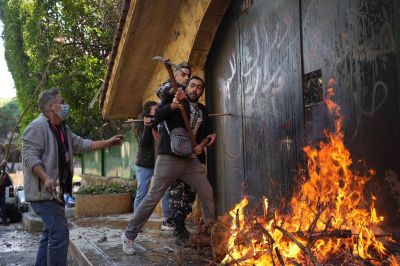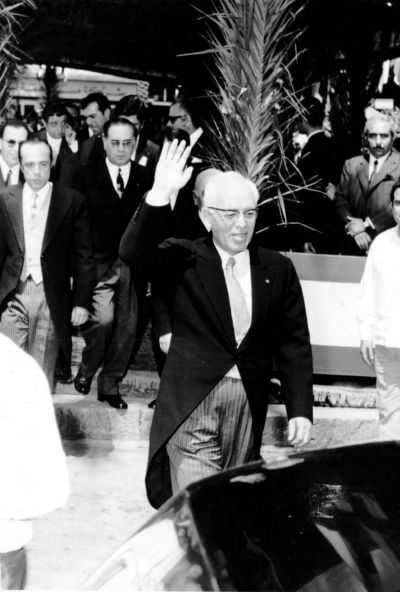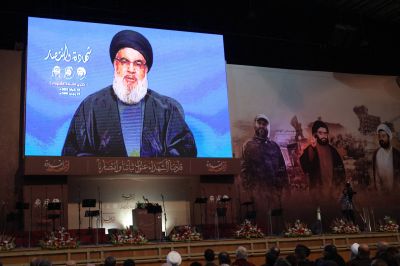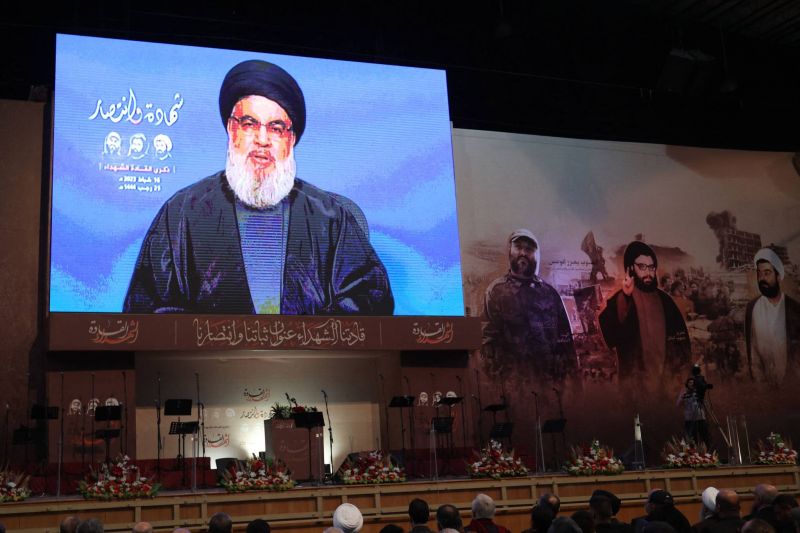
Supporters of Hezbollah attend a televised speech by the group's leader Hassan Nasrallah in Beirut's southern suburbs, on February 16, 2023. (Credit: Anwar Amro / AFP)
Hezbollah leader Hassan Nasrallah on Thursday threatened the United States and Israel, as Lebanon continues to grapple with an economic and political crisis that has recently seen a rise in security tensions.
In a speech broadcast live on the occasion of the commemoration of the "martyrs of the Resistance," Nasrallah threatened Washington in no uncertain terms, saying, "If the Americans are planning to create chaos that will lead to the collapse of Lebanon, I tell them: You will lose everything in Lebanon. We will use our weapons where it will hurt you, even if it will lead to a war with Israel."
On the political front, the Hezbollah secretary-general called for an "internal agreement" to lead to the election of a new Lebanese head of state, but said there is "nothing new" to report in this regard. The country has been without a president since Michel Aoun's term in office ended on Oct. 31. On Feb. 6, a meeting of Western and Arab powers was held in Paris to discuss Lebanon's political impasse.
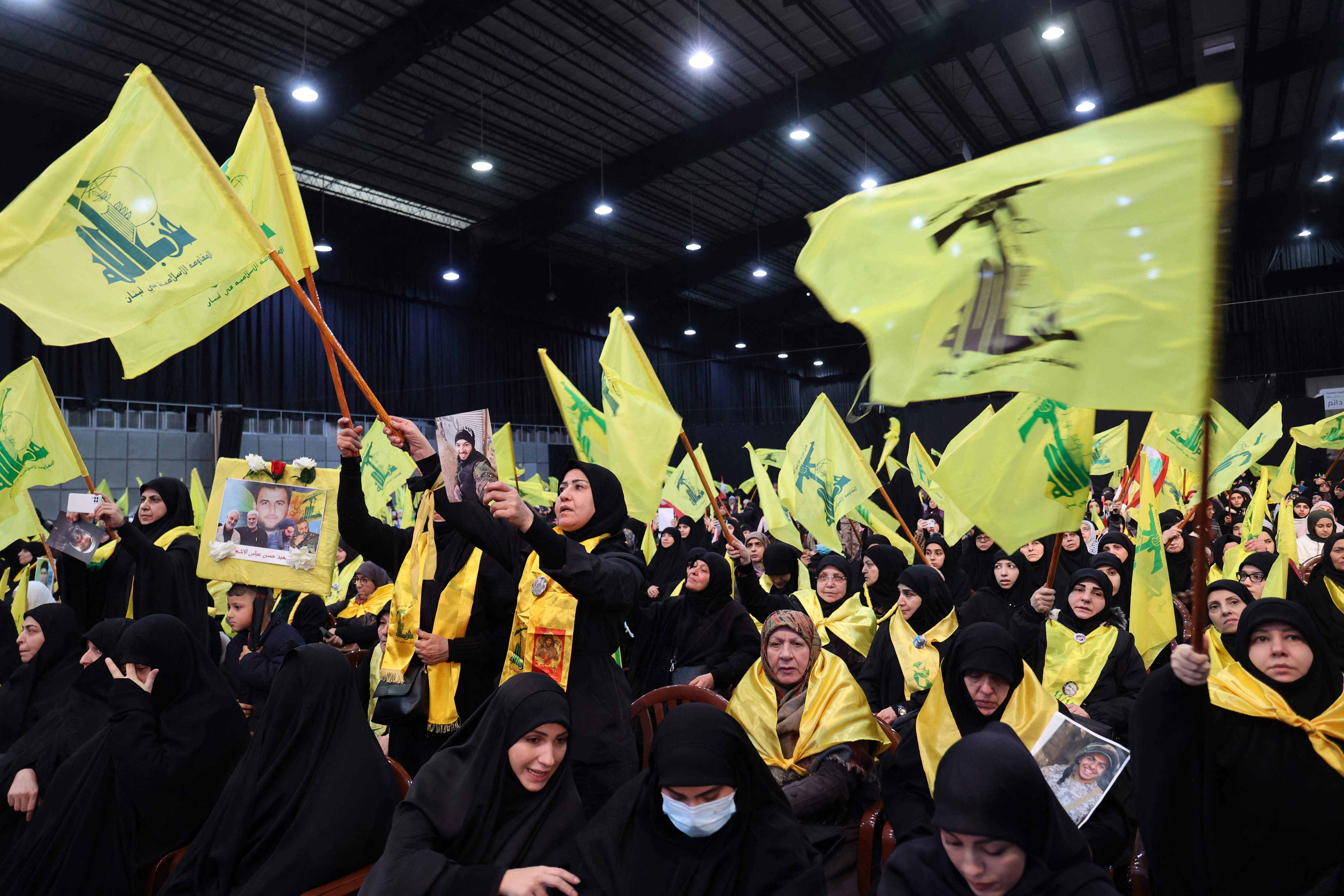 Lebanese women raise pictures of slain Hezbollah members as well as the Shiite group's flag, during a rally commemorating killed senior members of the party, in Beirut's southern suburbs, on Feb. 16, 2023. (Credit: Anwar Amro/AFP)
Lebanese women raise pictures of slain Hezbollah members as well as the Shiite group's flag, during a rally commemorating killed senior members of the party, in Beirut's southern suburbs, on Feb. 16, 2023. (Credit: Anwar Amro/AFP)
Threatening to use weapons
"If the Americans are planning to create chaos that will lead to the collapse of Lebanon, I tell them: You will lose everything in Lebanon. We will use our weapons where it will hurt you, even if it will lead to a war with Israel. You should expect chaos in the whole region. Those who think that we will stand idly by are mistaken," Nasrallah said, recalling that he was ready to use his party's weapons in case of failure of the negotiations on the maritime border with Israel.
He then commented on some press reports that Israel has begun exporting gas from the offshore Karish field.
"I read recently that Israel has started exporting gas from the Karish field. If we realize that there is procrastination about the exploitation of offshore gas and oil in our fields, we will not allow the enemy to extract these resources from Karish," he warned.
"I warn against procrastination. We need a courageous decision from the current government and the next government," he stressed.
Lebanon reached a historic agreement with Israel in October 2022 on the delimitation of their common maritime border, after years of US mediation. The agreement means that the Karish offshore gas field is located entirely in Israeli waters in the eastern Mediterranean. Lebanon, for its part, has full rights to explore and exploit the Qana field, located further north-east, part of which is in Israeli territorial waters. But to date, the Lebanese authorities have not succeeded in exploiting offshore gas resources.
'Nothing new'
Nasrallah also briefly addressed the current presidential impasse. "There is nothing new on the presidential issue. Everyone had been waiting for the Paris meeting, although it has not resulted in a communiqué and its meetings remain open," he said.
On Feb. 6, the ambassadors to Lebanon of the United States, France, Saudi Arabia, Qatar, Kuwait and Egypt met in Paris. They discussed the election of the next Lebanese president, the program he should follow and the profile of the ideal candidate, as well as his political line and his economic and financial roadmap. However, no official statement was issued at the end of the meeting. The participants then met on Monday with Parliament Speaker Nabih Berri and caretaker Prime Minister Najib Mikati, and on Wednesday with caretaker Foreign Minister Abdallah Bou Habib. On each occasion, they called for serious economic reforms and the election of a new president without delay. They also said international aid is conditional on these demands.
'The whole world cannot impose a president'
"We continue to say that … the whole world cannot impose a president on Lebanon. There must be an internal agreement and the efforts must continue," Hezbollah's chief said.
The current government, which resigned in May 2022 following parliamentary elections, is serving in a caretaker capacity and is therefore limited to handling day-to-day affairs. Meanwhile, Lebanon has been mired in a severe economic crisis for over three years.
Since September, 11 parliamentary sessions have been held to elect a new president, without success due to the lack of political consensus between the different parties. Each parliamentary session is adjourned after a first round of voting, when the departure of MPs from Hezbollah, the Amal Movement and the Free Patriotic Movement (FPM) leads to a loss of the quorum required by Berri — 86 MPs out of 128. In the last 11 sessions, Hezbollah and the majority of its allies have voted blank.
Recently, Hezbollah has made clear its support for the candidacy of its Christian ally Sleiman Frangieh, leader of the Marada Movement. This support has caused tensions between Hezbollah and its other major Christian ally, the leader of the FPM, Gebran Bassil, who is considered an unofficial candidate for the presidency.
In the meantime, the name of the army chief, Joseph Aoun, is circulating in diplomatic and local circles as a serious candidate for the presidency. But Gebran Bassil is opposed to this, while Hezbollah still supports Frangieh.
'Delicate phase'
In this context, Nasrallah commented on the Mar Mikhael agreement, reached in 2006 between his party and the FPM. "Because of the important deadlines in the country, the Mar Mikhael agreement is in a delicate phase," Nasrallah said, without further elaboration.
The tensions between Hezbollah and the FPM have raised fears for months that the agreement could implode. But for now, Hezbollah and the FPM assure that this agreement still holds, despite everything.
In his last speech on Jan. 19, Nasrallah called for the election of a president "who does not submit to American threats."
